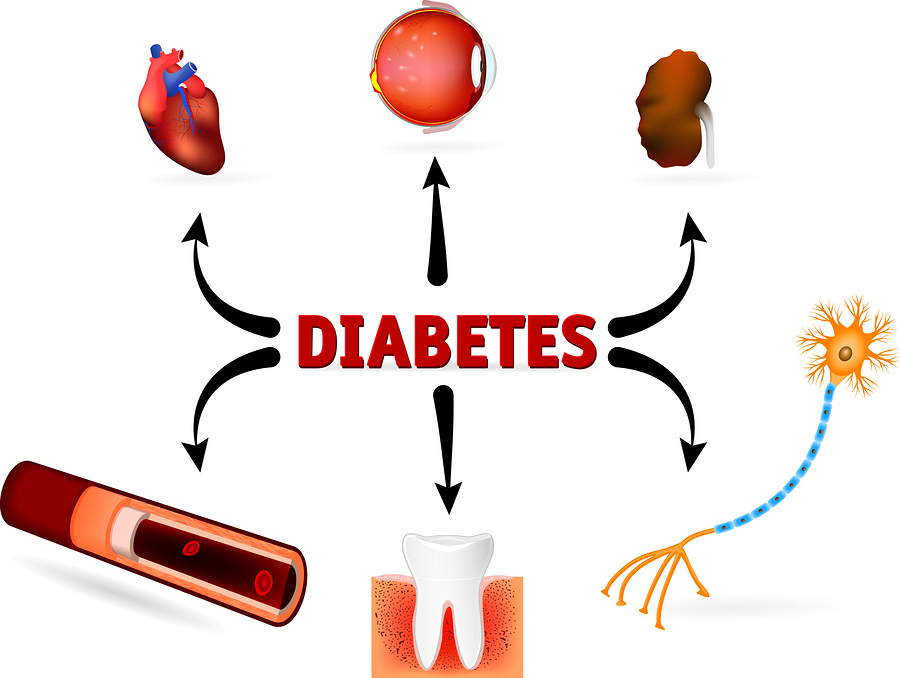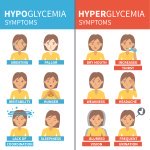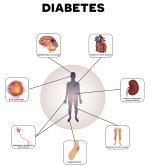Common Diabetes Complication

Cardiovascular disease is the most fatal diabetes complication. Other diabetes complications include kidney, nerve and eye disease.
Diabetes is a disease caused by the body's inability to produce insulin. This inability hinders the natural process of turning glucose into energy. Since diabetes disrupts the body's normal functions, there are many complications that can occur if the disease goes untreated or in some more severe cases of the disease. If you have been diagnosed with diabetes, you will have to work closely with your healthcare provider or doctor in order to develop a plan of action that will be best for you.
You may choose to go with natural treatment and supplement or regular medications or drugs. Either way, regular exercise and a healthy diet will be a vital part of your diabetes management. Once you have been diagnosed with diabetes, it is important to manage the disease in order reduce the chance of suffering from diabetes complications.
The Most Fatal Diabetes Complication
As I mentioned before, cardiovascular disease is the most fatal diabetes complication. Cardiovascular disease affects the heart and blood vessels. Fatal complications in this area include blood vessel ruptures on the heart (coronary arteries) leading to a heart attack and blood vessel ruptures in the brain (commonly called strokes). Other risk factors which contribute to cardiovascular problems include high blood pressure, high cholesterol and high blood glucose.
Diseases and Illnesses Caused by Diabetes
Diabetes can cause the onset of other diseases and illnesses. Some of the diseases that can be caused by a diabetes complication are even more serious than diabetes itself. Let's take a look at some of the complications that can result from diabetes:
• Heart disease - the complications of diabetes can make the risk of heart disease higher in people with diabetes.
• Neuropathy and Nerve Damage – likely the most insidious diabetes complication, neuropathy tends to sneak up on patients over a period of time. Patients don’t fully realize there is a problem until they fall, press the wrong pedal while driving or get a nasty foot infection. Neuropathy is damage to the nerves connecting the spinal cord to muscles, blood vessels, skin and other organs. Among the most commonly affected areas are the extremities, in particular, the feet. However, it can also lead to problems with digestion and erectile dysfunction .
• Eye complications - one of the most common symptoms of diabetes is blurred vision caused when the body takes fluid from other connecting tissues in order to compensate for the loss of insulin. Diabetics are at a higher risk of blindness.
• Skin – most individuals with diabetes suffer from some form of skin disorders. These disorders are often an indication that a person is diabetic. Skin disorders are preventable and can be treated.
• Kidney disease – in most cases, the symptoms of diabetes causes the kidneys to work harder than normal. This can prevent this the kidney from properly filtering waste products and could lead to kidney failure.
• Stroke - the complications of diabetes also place the individual at a higher risk of stroke.
• Gastroparesis - this disease usually manifest when the nerves to the stomach are severely damaged and causes the stomach to take too long to empty its contents. People who suffer from Gastroparesis usually experience heartburn, feeling full at the beginning of a meal, nausea, weight loss, vomiting undigested food, bloating, gastroesophageal reflux, loss of appetite and even spasms within the wall of the stomach.
• Feet - as a result of the nerve damage and poor blood circulation caused by diabetes, many diabetics develop problems with their feet. This diabetes complication results in a 25 times greater risk of foot amputation than for people without diabetes according to the International Diabetes Federation (http://www.idf.org/complications-diabetes).
• Depression - many illnesses and diseases can cause people to suffer from depression. The feeling of not having complete control over your body can often time lead people to a false sense of hopelessness and failure.
Diagnosis and Management of Diabetes
The diabetes complications discussed above is an indication of just how vital it is to detect diabetes as early as possible. Early detection is the best way to learn early on how to manage the symptoms of diabetes and reduce the chances of the diabetes complications leading to more serious diseases and illnesses. As soon as you are given a diagnosis of diabetes, you should start working with your doctor or healthcare provider to formulate a management plan for the disease. There is no cure for diabetes, but in many cases, it can be managed and controlled and the risks of it causing more serious complications can be drastically decreased.
Adequate management of your diabetes is a key factor in determining whether the disease will lead to more serious diseases and illnesses. The best way to remain in control is to formulate a management plan with your doctor, which should consist of a treatment plan, regular exercise, and a healthy diet.
According to one of the largest online diabetes communities with over 314,196 members, diabetes can be reversed by following a low carbohydrate diet. This has also been my experience.
Even if you have not been diagnosed with any form of diabetes, it is important to start a healthy lifestyle that includes regular exercise and a healthy diet so that diabetes and diabetes complications can be avoided and you can live a normal, healthy.



New! Facebook Comments
What do you think? Share your thoughts below...